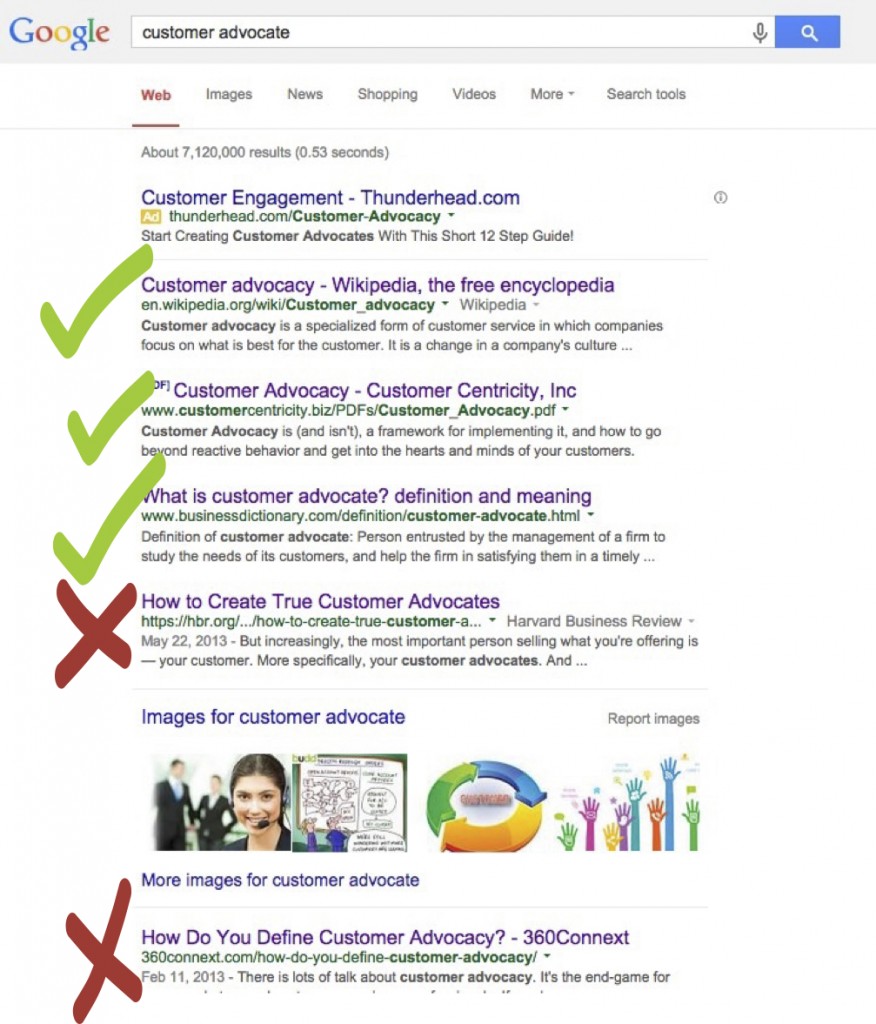We were recently discussing customer advocacy at Kayako when someone piped up: “Wait, is a customer advocate the same thing as a brand advocate?”
Fair question. They sound so similar that they could very well be the same thing. However, they mean two very different things…right?
We gathered around a Google search of “customer advocate” and realized that the Google search in fact, was the actual source of confusion. It seems two different, opposing definitions of the term have taken hold online— and both can’t be right.
So let’s start with what we know.
Are you ready to deliver Friction-Free Customer Service? Capture your customer’s entire journey in a way a support ticket or traditional help desk never could. Discover Kayako Single View
Customer Advocates ≠ Brand Advocates
The proper definition of a customer advocate is this:
Customer advocate: Person or function entrusted by the management of a firm to study the needs of its customers, and help the firm in satisfying them in a timely and cost effective manner.
That should make sense. They are, plainly speaking, the customer’s advocate. A person employed by a company to speak out on behalf of your customer’s interests. A company ombudsman, so to speak.
The first three hits on a quick Google search seem to confirm this.
But then it starts to get muddled.

- This Harvard Business Review article titled “How to Create True Customer Advocates” is really talking about brand advocates.
- Then the following 360Connext article titled “How Do You Define Customer Advocacy?” is also actually talking about brand advocacy.
These articles are mistaking customer advocates for brand advocates, which are something else entirely:
Brand advocate: Enthusiastic customers businesses can leverage as a source of referrals, traffic and marketing.
Brand advocates are customers who promote businesses they like among networks and refer friends and new business through word of mouth. They don’t belong to the company. That’s why it’s not at all possible to use these terms interchangeably.
So what exactly is a customer advocate?
Just as marketing, development, or design, customer advocacy is an internal function of a company. Beyond that, it’s up to companies themselves to define what that role of a customer advocate might look like:
Older, established companies are quite secure in their definition of customer advocacy, on which they’ve been running well-oiled customer advocate departments and even boards. For example:
Charles Schwab, where the Customer Advocacy Office manages and resolves customer issues that cut across the organization’s departments, including policies, pricing and product features.
GE, whose customer advocate tools enables B2B customers to submit an issue and receive a single point of contact at the company who pushes for a resolution within 1 business day.
VMware, where a customer advocacy team researches both internal stakeholders and customers to spur company-wide development. In 2014, priorities included product satisfaction, strategy & product plans and customer engagement.So for now, there can be only one definition of a customer advocate, and we’re going to stick with it.
For what it’s worth, this is a relatively new misnomer. However, as the role of customer advocacy picks up steam again among SaaS companies, it’s going to be problematic if we’re using the same term to talk about different things. So we’re setting the record straight and we’re going to stick by it.
What You Should Look for in a Good Customer Advocate?
Now that you understand what customer advocates are and their role within your organization, it’s important that you work with competent advocates if you want your customer advocacy strategy to work. Here are some of the traits you should be looking for in a good customer advocate.
Empathy
While empathy is not always the first quality to look for in a marketing or sales employee, it is absolutely essential that your customer advocates are empathetic by nature. Sales people are taught to be good listeners, but customer advocates need to be able to take it a step further. They not only have to be good listeners, they also have to actually take customers’ words at heart and truly feel what’s essential to them.
They Have No Problem Critiquing Corporate Culture
Customer advocates should be the ones that set the corporate wheels in motion and prevent them from stagnation. Corporate culture can put a wall between customers and an organization and a brand can easily lose touch with the main client base.
But according to Newton’s law of motion, no object can move unless external force is applied to it. Since customers have limited tools and influence to move the core of a business, an insider that works on their behalf can be the force that will push a company to revise its culture for the benefit of its customers.
They Should Be “Commitment” Minded and “Compliant” Minded
Many organizations have a compliance culture vs a commitment culture. These businesses will do the strict minimum to please their clients and will try to focus on the bottom line even if it means offering a barely passable, generic and often outdated product.
Commitment minded individuals should always be pushing for betterment. They are not satisfied with the minimum and go beyond requirements. You want advocates who have that fire in their belly and are simply not satisfied with the status quo.
Must Be Believable
In order for your advocates to be efficient, they have to be believable. Or else, they won’t be able to elicit real change. They have to not only be able to feel the issues affecting their clients, but be able to convey that emotion correctly.
And believability is not something that can be taught. It’s visceral and cannot be faked. Only someone who is truly committed to representing customers can be believable enough to genuinely get their point across.
They Know How to Deal with Bureaucracy
As agents of change, customer advocates have to understand how to work and sometimes clash with bureaucracy. If they don’t know how to navigate the waters correctly, constantly trying to push through that red tape can become exhausting.
They’ll have to know how to identify the true gatekeepers, be friendly and courteous, know exactly what their objectives are and understand the approval process. They also have to be ready to ask questions and have the people skills necessary to connect with higher ups on a personal level.
Customer advocates are closer to the public than any other people in your organization. They work as the missing link between customers and your marketing team and are crucial in pushing internal changes that will eventually benefit them in the long run, which only improves your brand image as a result.
What did you think customer advocacy was before this article? What do you think it is now? Also, feel free to include whether you think bimonthly means twice a month or every two months.
How did everyone get so confused about what a customer advocate is? https://t.co/RwRlPykvyX pic.twitter.com/UFWlOAw6sC
— Kayako (@Kayako) January 5, 2015


